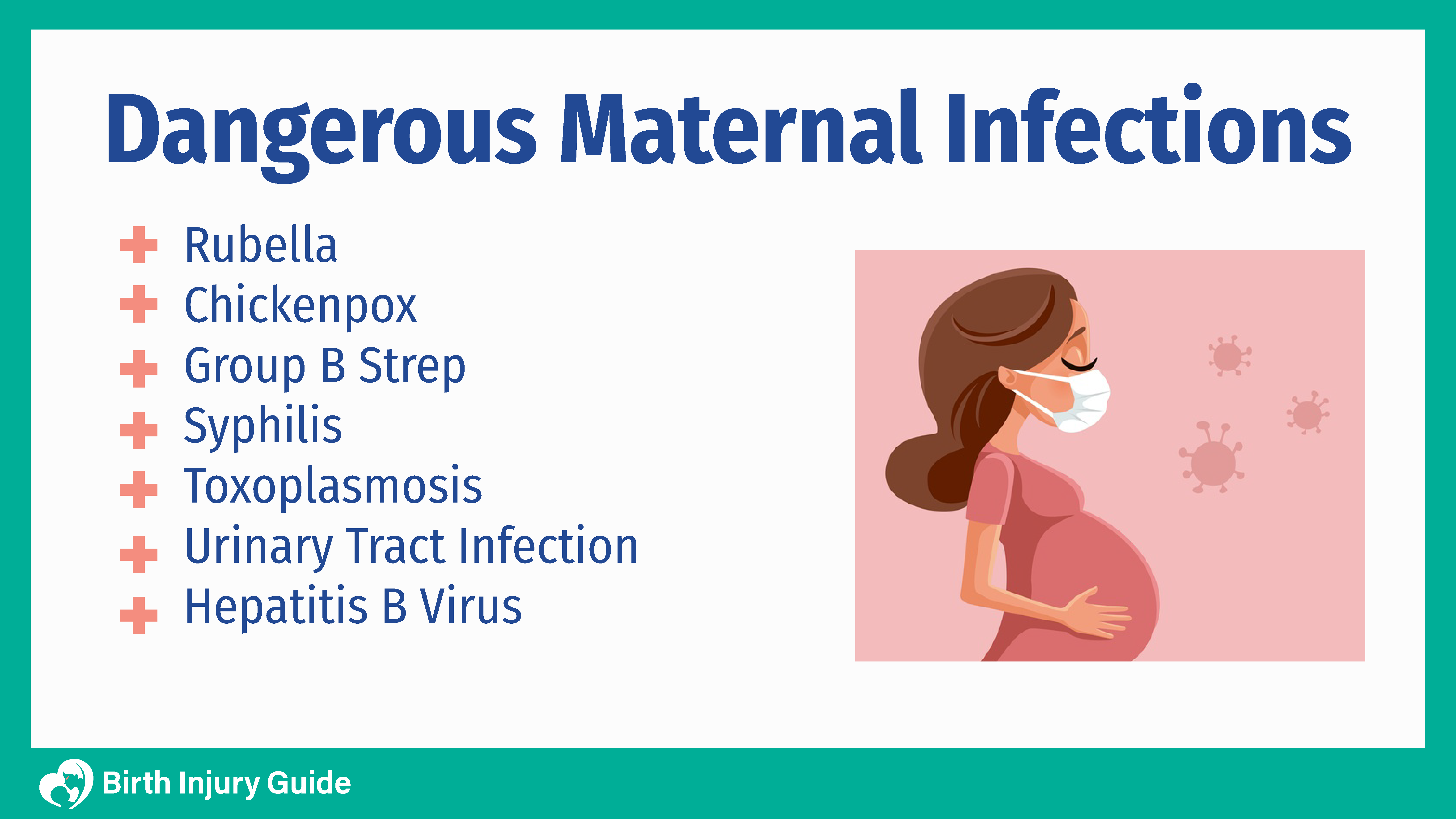
Maternal Infections
Getting the proper prenatal care is important for the health of both you and your infant. While pregnant, if an infection develops or a pre-existing infection isn’t diagnosed and treated, not only is the mother at risk of additional health issues, but the baby is at risk for a series of serious medical problems.
Types of Maternal Infections That Can Cause Birth Injuries
Not all maternal infections or illnesses will cause birth injuries, such as the common cold or a stomach bug. Yet, other maternal infections, if left untreated, can become extremely dangerous to unborn babies.

These infections are some of the most common and most dangerous when not diagnosed and treated:
Rubella
Rubella, also known as German Measles, was once a common childhood virus, marked by a unique red rash on the body. However, once rubella vaccinations became common in the United States in the mid-1960s, the rate of children developing rubella greatly decreased.
Pregnant women should always be tested as early as possibly during her pregnancy to ensure she was vaccinated and immune to the virus. If not, an early pregnancy vaccination can prevent the devastating risks of rubella.
According to the National Institutes of Health (NIH), advanced techniques in diagnosing should always be used in order to detect and treat rubella. The consequences of an infant contracting rubella from the mother are far more severe and can include:
- Hearing and vision problems
- Brain inflammation
- Cerebral palsy
- Intrauterine growth restriction (IUGR)
- Congenital heart disease
- Stillbirth
- Miscarriage
- Diabetes later in life
If the mother is vaccinated early in the pregnancy, there is a 90 percent chance that the virus will not affect the infant. The longer the mother goes through pregnancy without being treated, however, the lower the chances become.
Chickenpox
Chickenpox, known formally as varicella, is often thought of as a mild childhood disease that eventually goes away on its own. For unborn infants, babies under one year of age, and people over 15 years of age, however, chickenpox can lead to serious health issues, including:
- Congenital Varicella Syndrome (CVS)
- Pneumonia
- Scarring
- Vision issues
- Developmental delays
- Cognitive disabilities
According to the Organization for Teratology Information Service (OTIS), if chickenpox happens during the first trimester of pregnancy, the risks for birth injuries are one percent and less. The further along in the pregnancy, the higher the chances that chickenpox will result in birth injuries.
For example, between the 13th and 20th week of pregnancy, the risk of injuries increases to two percent. Women who have chickenpox during delivery have a 25 percent chance of the baby contracting congenital varicella syndrome or CVS. If you’ve never been vaccinated against chickenpox and you’re pregnant, it’s important that your physician right away. A vaccination, typically zoster immune globulin if you’ve been exposed to someone who has chickenpox or a chickenpox vaccine, is administered.
Group B Strep
Group B Strep (GBS) is a bacterial infection that affects up to 25 percent of all healthy women. GBS can be found in the gastrointestinal, vaginal, and/or rectal area. If not treated during labor, it can be passed on to the infant, resulting in complications such as:
- Brain damage
- Sepsis
- Pneumonia
- Stillbirth
Unfortunately, GBS is often difficult to detect at first as there are no symptoms. Per the American Academy of Pediatrics (AAP), it’s important to get tested for GBS as soon as possible, which typically consists of a swab that’s taken to a culture lab for analysis. GBS is not a sexually-transmitted disease, and as mentioned earlier, healthy women are just as prone to the infection as anyone else, so testing and if applicable, treatment, should be done.
GBS infection and related brain damage have been linked to serious medical conditions, including hypoxic ischemic encephalopathy (HIE). The hypoxic ischemic encephalopathy stage, or grade, will determine how serious brain damage is and the long-term impacts.
Syphilis
Caused by a spirochete bacterium, syphilis is a sexually-transmitted disease that can be transferred to an infant during pregnancy or during the birthing process via sores or through the placenta. It’s an extremely dangerous infection for infants as it can lead to:
- Fetal distress
- Vision and hearing loss
- Teeth malformations
- Neurological issues
- Low birth weight
- Neonatal death
- Stillbirth
Syphilis may lie dormant in the body only to surface years or decades later. However, if caught early on, it can possibly be cured with Penicillin. Pregnant women should always be tested for syphilis as soon as possible during an early prenatal appointment.
Toxoplasmosis
Toxoplasmosis is a parasitic infection most commonly caused by contact with parasites found in certain raw or under-cooked meats, cat feces, and soil. Pregnant women may experience mild flu-like symptoms or no symptoms at all, therefore taking proper precautions such as washing hands thoroughly, cooking meats completely, washing foods in hot water, and staying away from cat feces (including changing the litter box) is extremely important.
Toxoplasmosis can be transferred to an unborn baby, resulting in the risk of:
- Intellectual disabilities
- Hearing loss
- Blindness
Physicians should monitor and treat pregnant women with antibiotics used to eliminate the infection. Medication is given during pregnancy and in some instances, the infant will continue to receive treatment after birth.
Urinary Tract Infection
A urinary tract infection (UTI), is a bacterial infection in the urethra or the bladder, is marked by a strong urge to urinate, cloudy-colored urine, pelvic pain, and a burning sensation when urinating.
If treated, a UTI usually won’t pose any serious problems for an unborn infant. Yet if left untreated, a UTI can spread to the kidneys which can lead to preterm labor, which is associated with a myriad of infant health problems. UTIs are almost always treated with antibiotics.
Hepatitis B Virus
The hepatitis B virus (HBV) caused by hepatitis b, is extremely dangerous when passed along to a baby during birth. In fact, newborns have around a 90 percent chance of developing lifelong health issues, including liver damage and liver cancer. Pregnant women should always be tested as early in the pregnancy as possible, and if applicable, vaccination should be administered. If early testing and treatment wasn’t given, physicians should make sure to test before delivery, as the virus is passed along during childbirth.
Proper Care for Maternal Infections
As you can see, it is vital that doctors diagnose and properly treat maternal infections. Failure to do so could be a form of medical negligence, and could have lifelong repercussions on the mother and infant.
Sources:
- http://www.ncbi.nlm.nih.gov/pubmed/16580940
- http://www.ncbi.nlm.nih.gov/pubmed/6126663
- http://www.cdc.gov/vaccines/pubs/pinkbook/downloads/varicella.pdf
- https://academic.oup.com/cid/article-abstract/13/Supplement_11/S953/498569?redirectedFrom=fulltext
- https://academic.oup.com/cid/article/56/9/1223/293975?searchresult=1
- http://www.journal-of-hepatology.eu/article/S0168-8278(13)00137-2/abstract



